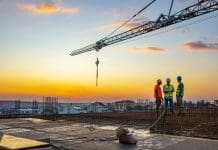The Modular & Portable Building Association (MPBA) chief executive Jackie Maginnis discusses the offsite arena and examines the uptake in modular construction
As an optimum building technique for timber, steel and concrete designs – volumetric modular construction is at the forefront of offsite techniques, making up 60-70% of the market. These solutions arguably form a modern method of construction that is experiencing entirely different growth trends to that of other offsite approaches.
Turnover in the modular sector
Despite recent reports that suggest government departments are not adopting a presumption in favour of offsite, the MPBA has research that shows volumetric modular construction is undergoing a period of considerable growth.
Over 50% of our membership supplied detailed financial information to support the MPBA’s survey report commissioned through the University of Salford. This market intelligence from 2018-2019, provides evidence of turnover in the modular and portable building sector that exceeds £2,956m.
This figure excludes the turnover from the major players who have recently entered the volumetric modular arena, including banking giant Goldman Sachs, which is investing £75m into modular housing business TopHat, as well as Japan’s biggest housebuilder striking a multimillion-pound deal that will see Sekisui House partner with Homes England and Urban Splash.
This agreement will also see a £55m investment into Urban Splash. But the largest deal by far was revealed by ilke Homes, involving a £100m agreement with Places for People.
Decrease in costs
The modular industry has had a remarkable impact on reducing costs while increasing quality and safety. Having gained considerable momentum over the past few years, advanced modular techniques reduce build times by an impressive 50-60%.
The demand for customisation has led the volumetric modular manufacturing industry to develop methods for adaptation during the mass production process to meet individual requirements.
Module selection is influenced by transportation dimensions and shipping distances. A number of other factors are also holistically considered to achieve optimal design efficiency.
Module connection details and quantities, installation and crane costing rates, and specific site logistics all must be considered, together with foundations/transfer decks, volumes of required materials and other service core requirements.
Well-managed environments
Each individual material can be selected specifically for its performance characteristics, tailoring every inch of a modular build. Eco-friendly materials are often specified and waste is recycled for future projects wherever possible. Not only this, but components are also available in a range of sizes for expansions whenever necessary.
As units are factory manufactured, stringent quality control processes can be undertaken within these well-managed environments. These in-house conditions also prevent weather from inhibiting the construction process, guaranteeing efficiency. On top of this, modular construction enables site work and building processes to be completed simultaneously, reducing labour costs and build times.
Modular approaches are revolutionising the construction industry. While traditional build processes are laced with pitfalls, hidden costs and are highly disruptive, volumetric modular buildings are easy to plan, budget and are quick to erect. Modular technology brings a host of benefits to the construction industry, contributing to healthier, safer and more cost-efficient environments.
About MPBA
The MPBA plays a key role in the connecting of sectors in the modular and portable building industry. The association collaborates with specialist technical advisers to enhance innovation in the design and manufacture of modular buildings.
These can be designed and manufactured from timber, steel or concrete, in any size and shape to meet individual client needs while ensuring full compliance with building regulations.
To discover how modular building can benefit offsite construction plans or to purchase the MPBA 2019 industry report go to www.mpba.biz.
The Modular & Portable Building Association Limited (MPBA)
Tel: 0870 241 7687
Twitter: MPBAUK
Please note: this is a commercial profile.

















